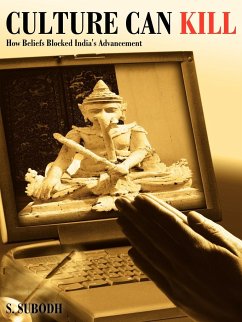Why do certain societies advance and others fall behind? Why did a European discover India rather than an Indian discovering Europe? Taking India as a specific example, this book affirms that Culture Counts. Some beliefs, though helpful in personal life, can have disastrous long-term consequences on groups. Many popular beliefs blocked India's progress. They still do. This book spells them out. Divided into four sections, in a stepwise exposition, it defines India's Disease, describes Symptoms, analyzes Causes and suggests Remedies. Environment, economics, fate, foreigners, sins or genes did not cause the downfall of this once magnificent civilization into depths of destitution today and despair in the face of foreign aggressions in the past. India's much vaunted culture---beliefs, values, goals, attitudes---killed her. Surprised? Shocked? As they always say, the devil is in the detail. Can we Indians reverse the course of history? Yes. We must shed our vanity in our distant hazy past. Fleeting localized successes should not blind us to the grim realities of everyday life in India today. We must transform our culture and religion from a theoretical, pessimistic, defeatist philosophy to a positive, forward looking, action-based outfit. We must modernize our minds genuinely, not just cosmetically. This book elucidates this unconventional, basically rationalist, approach. It examines in laser light everyday problems that educated Indians casually discuss in their drawing rooms, arrive at a dead end and disperse without direction. Intellectually robust, boldly challenging, freshly innovative, this book revisits ancient assumptions and myths believed in by a billion people---nuclear armed, shooting for the moon and starving in the streets. And in the process, it illuminates the way to a brave new world of the future for an ancient culture desperately struggling to emerge into modernity.
Hinweis: Dieser Artikel kann nur an eine deutsche Lieferadresse ausgeliefert werden.
Hinweis: Dieser Artikel kann nur an eine deutsche Lieferadresse ausgeliefert werden.








